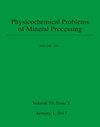有机溶剂型木质素颗粒作为生态药剂在铜矿石浮选中的应用
IF 1.2
4区 工程技术
Q4 CHEMISTRY, PHYSICAL
引用次数: 0
摘要
矿物分离在很大程度上依赖于浮选过程。本研究探讨了有机溶剂木质素纳米颗粒和微颗粒(OLP)在矿物分离浮选过程中作为黄原药的绿色替代品的可行性。黄原酸盐被广泛使用,但会带来环境和健康风险。将OLP作为捕收剂的效率与无捕收剂浮选进行了比较,结果表明OLP的铜回收率约为50%,这表明OLP可能不是黄药的合适替代品。进一步的测试使用黄药和OLP(纳米桦木和微云杉)的混合物,不同的取代水平(20%,30%和40%)。结果表明,OLP用量的增加会导致铜浮选效率的降低。产品TOC分析表明,高剂量(160 g/t)的桦木纳米和云杉微捕收剂对铜具有选择性富集和选择性回收作用。虽然olp没有被证明是有效的捕收剂,但研究强调了它们作为麦芽糖糊精在最终精矿选择性浮选中的替代品的潜力。4个测试的olp中有2个建议进行中试规模测试。本文章由计算机程序翻译,如有差异,请以英文原文为准。
Organosolv lignin particles as an ecological reagents in the Kupfershiefer copper ore flotation
Mineral separation relies heavily on the process of flotation. This study explored the feasibility of using organosolv lignin nanoparticles and microparticles (OLP) as a greener alternative to xanthates in the flotation process for mineral separation. Xanthates are widely used but pose environmental and health risks. The efficiency of OLP as collectors was compared to collectorless flotation, resulting in approximately 50% copper recovery, indicating that OLP may not be a suitable replacement for xanthates. Further tests were conducted using a mixture of xanthates and OLP (birch nano and spruce micro) with varying substitution levels (20%, 30%, and 40%). The results demonstrated that increasing the dosage of OLP led to a decrease in flotation efficiency for copper. TOC analysis of the products revealed that high dosages (160 g/t) of birch nano and spruce micro as sole collectors showed beneficiation and selective recovery against copper. While OLPs did not prove effective as collectors, the study highlights their potential as substitutes for maltodextrin in selective flotation of the final concentrate. Two out of four tested OLPs were recommended for pilot scale testing.
求助全文
通过发布文献求助,成功后即可免费获取论文全文。
去求助
来源期刊

Physicochemical Problems of Mineral Processing
CHEMISTRY, PHYSICAL-MINING & MINERAL PROCESSING
自引率
6.70%
发文量
99
期刊介绍:
Physicochemical Problems of Mineral Processing is an international, open access journal which covers theoretical approaches and their practical applications in all aspects of mineral processing and extractive metallurgy.
Criteria for publication in the Physicochemical Problems of Mineral Processing journal are novelty, quality and current interest. Manuscripts which only make routine use of minor extensions to well established methodologies are not appropriate for the journal.
Topics of interest
Analytical techniques and applied mineralogy
Computer applications
Comminution, classification and sorting
Froth flotation
Solid-liquid separation
Gravity concentration
Magnetic and electric separation
Hydro and biohydrometallurgy
Extractive metallurgy
Recycling and mineral wastes
Environmental aspects of mineral processing
and other mineral processing related subjects.
 求助内容:
求助内容: 应助结果提醒方式:
应助结果提醒方式:


